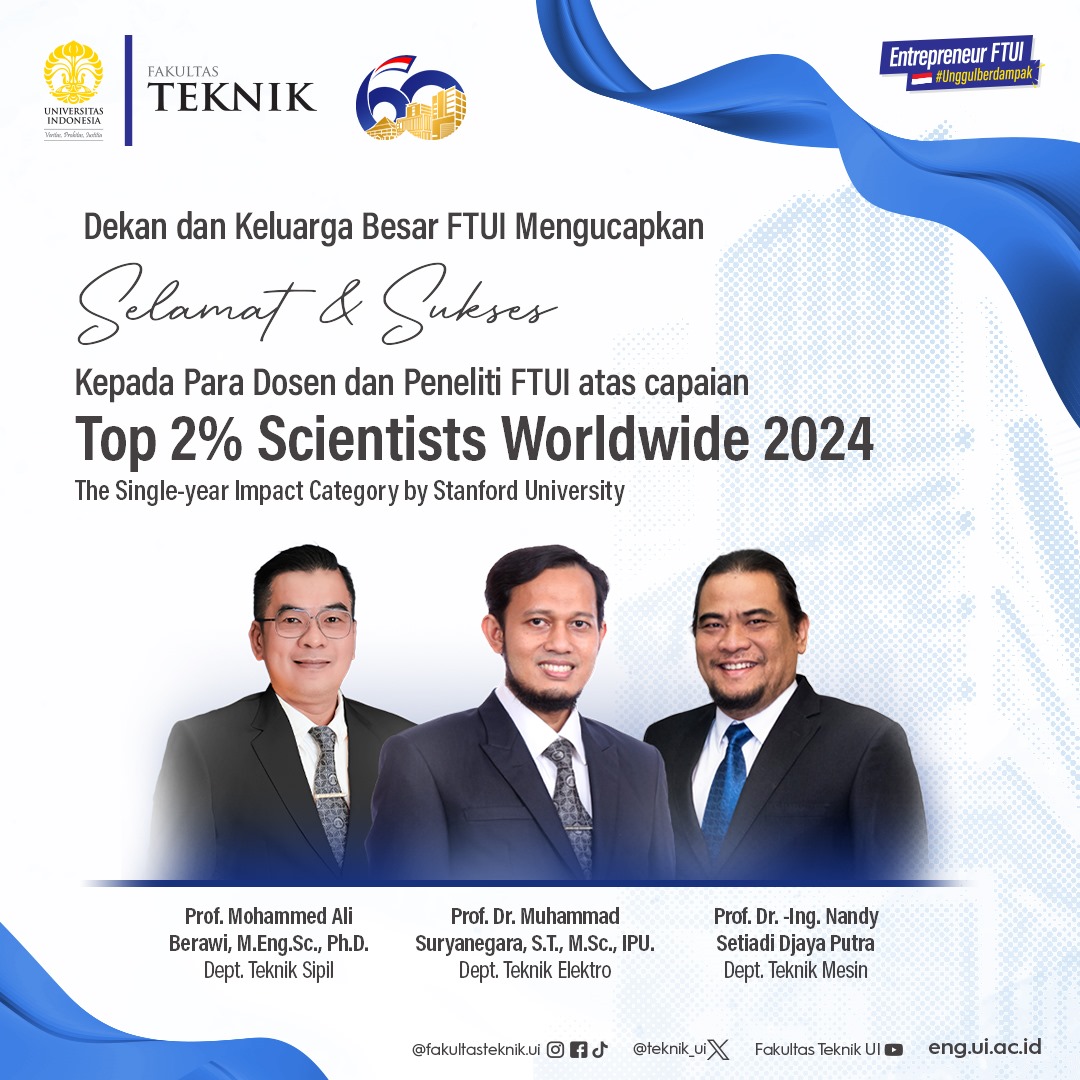After successfully listing nine of its researchers in the Top 2% of Scientists Worldwide according to Stanford University in 2023, this year Universitas Indonesia (UI) has once again achieved a remarkable feat by placing thirteen of its researchers in the same category. The thirteen UI professors and researchers who made it into the “Top 2% Scientist Worldwide 2024” come from the Faculty of Medicine (FK), Faculty of Engineering (FT), Faculty of Mathematics and Natural Sciences (FMIPA), and the School of Environmental Science (SIL).
Three out of the thirteen professors and researchers included in the Top 2% World Ranking Scientists are from the Faculty of Engineering: Prof. Mohammed Ali Berawi, M.Eng.Sc., Ph.D. (Civil Engineering), Prof. Dr.-Ing. Nandy Setiadi Djaya Putra (Mechanical Engineering), and Prof. Dr. Muhammad Suryanegara, S.T., M.Sc. (Electrical Engineering).
The “Top 2% Scientist Worldwide 2024” list is published by Stanford University in collaboration with Elsevier BV. This list is compiled by Prof. John P.A. Ioannidis, M.D., Ph.D., from Stanford University, and represents the seventh edition of the publication “Updated Science-Wide Author Databases of Standardized Citation Indicators” released by Elsevier.
Stanford University published the latest database of scientists on September 16, 2024, which was compiled based on standardized citation indicators. The database includes detailed information on various citation metrics, including the number of citations, h-index, and hm-index adjusted for co-authorship, as well as a composite indicator (c-score).
The scientists included in this database are grouped into 22 scientific fields and 174 sub-fields based on Science-Metrix classification standards. Selection is based on the c-score—both with and without self-citations—among the top 100,000 scientists or those in the top 2% of their respective sub-fields.
In the Single-Year Impact category (citation data for 2023), three professors and researchers from FK who received this recognition are Prof. dr. Jeanne Adiwinata, M.S., Ph.D.; Prof. dr. Indah Suci Widyahening, M.S., M.Sc., CM-FM., Ph.D.; and Prof. Dr. dr. Sri Rezeki Hadinegoro, Sp.A.(K). From FT, the same recognition was awarded to the three recipients from FTUI: Prof. Mohammed Ali Berawi, M.Eng.Sc., Ph.D.; Prof. Dr.-Ing. Nandy Setiadi Djaya Putra; and Prof. Dr. Muhammad Suryanegara, S.T., M.Sc. Five researchers from FMIPA who were also included in this list are Prof. Dr.rer.nat. Rosari Saleh; Prof. Dr. Yoki Yulizar, M.Sc.; Munawar Khalil, S.Si., M.Eng.Sc., Ph.D.; Dr. Dipo Aldila, S.Si., M.Si.; and Dewangga Oky Bagus Apriandanu, M.Si., Ph.D. Meanwhile, one other researcher from SIL is Dr. Herdis Herdiansyah, S.Fil.I., M.Hum.
In the Career-Long Impact category (citation data for their entire career up to the end of 2023), three professors and researchers who were included in this list are Prof. Dr.-Ing. Nandy Setiadi Djaya Putra; Prof. Dr. Ivandini Tribidasari A, S.Si., M.Si., Ph.D.; and Prof. Mohammed Ali Berawi, M.Eng.Sc., Ph.D.
The Vice-Rector for Research and Innovation, drg. Nurtami, Ph.D., SpOF(K), expressed her highest appreciation to the thirteen UI professors and researchers who achieved recognition as part of the 2024 Top 2% Scientists Worldwide. She noted that this achievement is the result of the transformation carried out by the Research and Innovation Directorate over the past two years, with a focus on fundamental research aimed at producing high-quality and impactful publications.
“This achievement is a testament to the outstanding dedication of our academics in research and innovation. The accomplishment of the three FTUI Professors being included in the Top 2% Scientists Worldwide 2024 demonstrates the quality and significant contributions continuously provided by the Faculty of Engineering, Universitas Indonesia, on the global scientific stage. We are proud and will continue to support the advancement of research and the development of knowledge for the glory of the nation,” said Acting Dean of FTUI, Prof. Ir. Mahmud Sudibandriyo, M.Sc., Ph.D.
***
Public Communication Office
Faculty of Engineering, Universitas Indonesia

